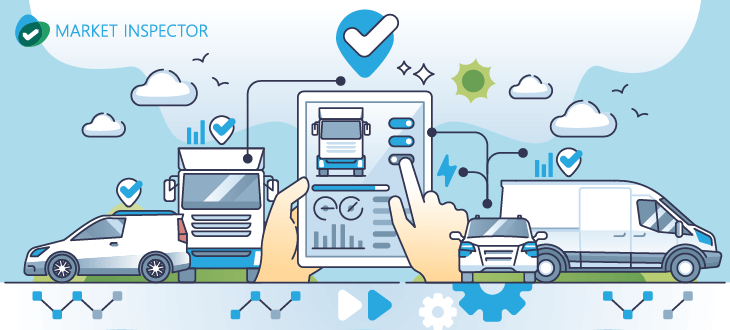Answer these simple questions and we will find you the BEST prices
Which type of solar quotes do you need?
It only takes 30 seconds
100% free with no obligation

Get up to 4 quotes from our selected suppliers by filling in only 1 form

Save money by comparing quotes and choosing the most competitive offer

Our service is 100% free and with no obligation
- Market-Inspector.co.uk
- Vehicle Tracking
- Vehicle Tracking Cost
- Cheap GPS trackers
Cheap GPS Trackers: How to Find the Best


- For fleet monitoring purposes, cheap vehicle tracking devices should not lack features like detailed reporting, driver behaviour monitoring, and fuel consumption analysis.
- Affordable tracking devices offer lower upfront costs, essential features for fleet management, improved operational efficiency, and a layer of theft prevention, providing significant value, especially for small businesses.
- It's important to note that cheap trackers may have limitations in functionality, durability, and scalability. There could also be potential hidden costs in subscriptions and maintenance, which could affect long-term efficiency and growth.
Businesses are increasingly turning to cheap GPS tracker solutions to enhance their operations and security. These affordable vehicle tracking devices strike a balance between functionality and affordability, allowing you to effectively monitor and protect your commercial fleets without incurring significant expenses.
This guide delves into cheap tracker options, shedding light on essential features, costs, and the value they can bring to your business. Read on to find out more.
- Describe your needs
- Get free quotes
- Choose the best offer
It only takes 30 seconds

Features and costs of cheap vehicle tracking devices and software

Cheap car tracker devices and some of the best cheap car tracker software are equipped with essential features even at their lower price point. These functionalities, such as real-time tracking, geofence alerts, speed monitoring, and access to historical tracking data, are vital for boosting fleet efficiency, improving safety, and reducing unnecessary expenditures. This reassures you that even with a limited budget, you can make a smart and informed decision.
The price for cheap tracking devices typically ranges from £30 to £100 as a one-time purchase. Installation can add between £50 and £150 to the total cost, depending on whether professional assistance is needed or if you opt for a DIY installation.
According to Fleetsmart, a UK-based fleet and asset tracking company, the following features are vital for your tracking needs. Let's examine each feature in depth.
- Real-time GPS tracking: The core function allows businesses to monitor vehicle locations in real-time, enhancing route optimization and ensuring driver accountability.
- Geo-fencing: This feature sends alerts when a vehicle enters or exits predefined geographic boundaries. It is helpful to ensure vehicles stay on route or within operational areas.
- Historical data and reporting: Access to historical route data can help analyse routes for efficiency improvements and is essential for dispute resolution and compliance.
- Speed monitoring: Monitors vehicle speed, aiding in safety enforcement and reducing the risk of speeding fines.
- Idle time tracking: Identifies when vehicles are running but stationary, a critical metric for reducing fuel wastage and optimising driver productivity.
- Maintenance alerts: Notifications for scheduled maintenance can prevent costly repairs and extend vehicle life.
- Battery life and connectivity: Especially for portable devices, long battery life and reliable connectivity are essential to ensure consistent tracking.
Now that we have looked at the features let’s consider the costs.
-
Starting price
Vehicle tracking device prices vary greatly, depending on their features. Basic models start around £40-£80 each, with more sophisticated systems increasing in price from this base. -
Top price range
For high-end models with driver behaviour analysis, advanced reporting, and broad integration capabilities, costs can rise to several hundred pounds per device, not factoring in the installation or ongoing subscription fees. -
Installation fees
These can cost nothing if you opt to install the plug-and-play device yourself. In contrast, a professional installation of a more complex, hardwired unit will cost a one-off fee of between £120-£160.
The pricing for cheap car tracking software and apps varies, from free versions offering basic functionalities to more comprehensive subscription plans costing between £5 and £30 per month.
Vehicle tracking software plays a crucial role in managing fleets efficiently. It provides real-time data and insights that help businesses optimise operations and reduce costs.
Even the most affordable vehicle tracking software solutions have a set of core features that meet fleet management's basic needs. Understanding these essential features and the associated costs can help businesses make informed decisions when selecting a vehicle tracking system.
Apart from the aforementioned real-time location tracking and geo-fencing, let’s examine the essential features of affordable vehicle tracking software.
- Trip history: This provides records of each vehicle's travel history, assisting in route optimization and verifying service calls or deliveries.
- Alerts and notifications: The system sends instant alerts for specific events, such as speeding, idling, or entering a restricted area, helping to enforce safe and efficient driving practices.
- Reports: Generates detailed reports on vehicle usage, including travel routes, stop times, and behaviour incidents, essential for analysing operational efficiency and planning improvements.
- User Interface (UI): A simple and intuitive UI is crucial for easy navigation and utilisation of the software's features without extensive training.
- Mobile app access: Offers the flexibility to monitor fleet activity and receive alerts on the go, ensuring managers stay informed no matter where they are.
Subscription costs
When discussing the subscription costs for vehicle tracking services, it's important to note that while many services have a monthly or yearly fee, typically ranging from £8 to £24 per vehicle per month, there are also vehicle tracking solutions available without subscription costs at all. These can be particularly appealing for businesses looking to minimise ongoing expenses.
Vehicle trackers for security and insurance

Vehicle tracking devices are essential tools for enhancing vehicle security and often play a pivotal role in meeting insurance requirements. To deter the theft of commercial vehicles or comply with insurance prerequisites, the cheapest insurance-approved vehicle tracker needs robust security features, such as tamper alerts, notifications for unauthorised use, and the ability to remotely disable vehicles.
According to the Association of British Insurers (ABI), a UK-based insurance and long-term savings company, installing a tracking device can assist law enforcement in locating your vehicle if it is stolen, facilitating the recovery of both the vehicle and its contents.
These security-focused cheap vehicle tracker models usually cost between £ 40 and £150 as a one-time purchase, reflecting the comprehensive security features they incorporate.
For businesses seeking to protect their assets from theft or to comply with insurance mandates without incurring excessive costs, understanding the key features that even the most budget-friendly trackers should possess is crucial. Here's a closer look at these characteristics and the price ranges for this specific category of devices.
- Tamper alerts: Devices should be equipped to notify owners or managers immediately if there's an attempt to tamper with the tracker, ensuring swift action can be taken.
- Real-time GPS tracking is essential for locating a vehicle quickly in case of theft. It allows for immediate reporting to law enforcement and potentially reduces recovery time.
- Daily monitoring capability: The system should offer around-the-clock monitoring to ensure vehicles are protected at all times, particularly during off-hours when theft is more likely to occur.
- Geo-fencing: Enables businesses to set geographical boundaries and receive alerts if a vehicle moves outside these areas, indicating a possible unauthorised use or theft.
- Battery backup: In case thieves disconnect the vehicle's power supply, a backup battery ensures the tracker continues to work, increasing the chances of recovering the stolen vehicle.
- Ignition cut-off feature: Some trackers offer the ability to remotely disable the vehicle's ignition, making it more difficult for thieves to move the vehicle once it has been identified as stolen.
- Insurance approval: The device should be compliant with any specific requirements set forth by insurance companies, which may include certifications or particular technological standards.
The prices for security and insurance vehicle trackers are as follows:
-
Entry-level pricing
Basic security trackers, offering essential features like real-time tracking and geo-fencing, are priced from £40 to £80 each. These devices provide crucial but effective protection against theft. -
Mid-level pricing
The cost of trackers with extra security features such as tamper alerts, battery backup, and some remote control functions varies between £80 and £200. These devices offer enhanced security and typically comply with insurance requirements for potential discounts. -
Installation and ongoing costs
Installation fees range from minimal for easy-to-set-up devices to around £80 to £160 for systems needing professional installation. For continuous access to the tracking platform and data, monthly subscriptions are priced from £8 to £24 per vehicle, tailored to the comprehensiveness of the service.
For commercial vehicles and fleets, investing in vehicle tracking devices that meet both security needs and insurance requirements is not just about complying with policies but also about safeguarding the business's logistical backbone.
Vehicle trackers and software for fleet monitoring

For fleet monitoring purposes, cheap vehicle tracking devices should not lack features like detailed reporting, driver behaviour monitoring, and fuel consumption analysis. These capabilities enable route optimization, fuel savings, and heightened driver safety. The price range for cheap GPS tracker devices catering to fleet management is between £50 and £200 as a one-time purchase, indicative of their advanced functionality.
Based on data retrieved from Vehicle Defence, a supplier and installer of vehicle security devices, let’s examine the essential characteristics of a tracking device used for fleet monitoring.
Apart from the aforementioned real-time GPS tracking and geo-fencing, your tracker needs to have the following capabilities.
- Route history: Access to historical routing data is crucial for analysing fleet efficiency, improving future route planning, and verifying service calls or deliveries.
- Vehicle health monitoring: Even basic systems should be able to alert fleet managers to potential vehicle maintenance issues, such as engine trouble codes, helping to prevent costly breakdowns and extend vehicle lifespan.
- Driver behaviour monitoring: Monitoring speeding, harsh braking, and rapid acceleration can help identify risky driving behaviours, enhance safety, and potentially reduce insurance costs.
- Fuel usage tracking: Understanding fuel consumption patterns is essential for identifying areas to improve fuel efficiency and reduce operational costs.
- Simple integration and usability: The system should be user-friendly and capable of integrating with existing operational software, ensuring that businesses can easily access and interpret tracking data.
Let’s look at the price ranges for fleet monitoring systems below.
-
Entry-level pricing
Starting prices for basic vehicle tracking systems, equipped with essential fleet monitoring functionalities such as real-time GPS tracking, geo-fencing, and historical route data, range from £40 to £120 per unit. These solutions provide the core capabilities needed to maintain oversight of your fleet's movements. -
Mid-level pricing
For systems that incorporate advanced features, including vehicle health notifications, driver behaviour insights, and fuel consumption analysis, expect prices to fall between £120 and £240. These enhanced devices deliver a more detailed perspective on fleet operations, aiding in improved management and potential cost reductions. -
Installation and subscription costs
The installation expense can vary, with simpler plug-and-play models typically not necessitating professional setup, whereas more complex hardwired units may incur charges from £80 to £160 for professional installation. Additionally, the cost for ongoing software access and data analysis, critical for maximising the utility of your tracking system, usually ranges from £12 to £24 per vehicle monthly, contingent on the comprehensiveness of the services provided.
According to the Telematics Survey 2024 conducted by Teletrac Navman, the adoption of AI and telematics is increasing among fleet operators to address challenges such as rising fuel costs and driver retention.
The survey reports significant benefits, with 96% of respondents acknowledging savings from using telematics in areas like fuel consumption and administrative efficiency. Additionally, 47% of operators incorporate AI to enhance these efficiencies, leveraging automated systems for route optimisation and predictive maintenance.
Telematics systems play a critical role in improving driver safety and well-being, with investments in technology supporting mental health and enhancing performance through rewards programs. These efforts contribute to a safer driving culture and higher driver retention rates, which are crucial in a sector experiencing tight margins and high competition.
Sustainability and decarbonisation
The shift towards sustainable energy sources, such as electric vehicles (EVs), is increasingly prominent. Despite the challenges of high costs and limited charging infrastructure, many fleet managers are planning to transition to EVs and alternative fuels as part of their strategy to manage rising operational costs and align with environmental regulations.
Integrating telematics and AI technologies into vehicle tracking solutions offers substantial cost savings, enhanced safety, and support for broader sustainability goals. As fleet operations evolve, these advanced technologies will be essential for businesses aiming to maintain a competitive edge and ensure operational efficiency in a dynamic economic landscape.
Cheap tracking devices: Pros and cons
Selecting the appropriate cheap GPS tracker for your business involves weighing the balance between cost and functionality.
Among the range of more affordable options, you can identify devices and software that satisfy your security and monitoring requirements without significantly impacting your budget.
Opting for cheap tracking devices for commercial vehicles can be an appealing cost-saving measure for businesses looking to improve fleet management without a hefty investment. However, it's crucial to weigh the advantages against potential drawbacks. Here's a breakdown of the pros and cons.
Pros
- Cost-effective: The most obvious benefit is the lower upfront cost, making it financially feasible for small businesses or those with large fleets to deploy tracking technology across all vehicles without a significant financial burden.
- Essential features: Many affordable tracking devices come equipped with essential features such as real-time GPS tracking, geo-fencing, and basic reporting capabilities, offering substantial value for most fleet management needs.
- Improved efficiency: Even basic tracking solutions can lead to better route planning, reduced fuel consumption, and enhanced customer service by providing real-time location data.
- Theft prevention: Cheap trackers can serve as a deterrent against theft and aid in the recovery of stolen vehicles, offering businesses a layer of security at a minimal cost.
Cons
- Limited functionality: Lower-cost options may lack advanced features like detailed driver behaviour analytics, comprehensive reporting tools, and integration capabilities with other fleet management software, potentially limiting the depth of insights and optimizations that can be achieved.
- Durability and reliability issues: Cheaper devices might not be as durable or reliable as their more expensive counterparts, leading to potential gaps in tracking data due to device failure or connectivity issues.
- Additional costs: The initial low cost might be misleading when considering long-term expenses. Subscription fees for accessing the tracking software and potential costs related to device maintenance or replacement can add up.
- Scalability limitations: As a business grows, the need for more sophisticated tracking and fleet management solutions will grow too. Cheaper tracking devices may not scale well or integrate smoothly with more advanced systems, necessitating a future overhaul of the tracking infrastructure.
While the cheapest vehicle tracker device for commercial vehicles offers a cost-effective entry point into fleet management technology, businesses must carefully consider their long-term needs and potential growth.
The initial savings could be offset by the need for more comprehensive solutions as operational demands evolve. Balancing cost against functionality and scalability is key to ensuring that the chosen tracking solution supports both current needs and future ambitions.
Getting tailored quotes may help you make the best choice for your business.
- Describe your needs
- Get free quotes
- Choose the best offer
It only takes 30 seconds

FAQ
The cheapest car tracker options start at around £30, offering basic but effective tracking capabilities as a one-time purchase. Despite their low cost, these trackers provide crucial features like real-time location updates, making them ideal for budget-conscious users needing essential tracking services.
Some apps and services provide free basic tracking features, utilising the GPS function of a smartphone or tablet. This option suits small businesses wanting simple vehicle monitoring without additional costs.
Yes, there are car tracker models available that do not require monthly subscriptions, although they often have limited features. Opting for these trackers means benefiting from cost savings over time, though with some compromises on advanced functions.
The installation of a cheap car GPS tracker can range from £50 to £150 as a one-time fee, depending on the device and the complexity of the installation process. Professional installation ensures the tracker is appropriately set up for optimal performance, offering a balance between affordability and security.

Nicole Bea Kerr is a content writer for Market Inspector, leveraging her experience in B2B journalism and editing. She is interested in bringing more awareness to sustainability and helping businesses make informed choices through insightful narratives.
We strive to connect our customers with the right product and supplier. Would you like to be part of Market Inspector?

